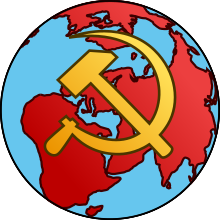Bolshevization: Difference between revisions
Fix a few mechanical and word choice issues. |
No edit summary |
||
| Line 1: | Line 1: | ||
[[File:Comintern Logo.svg|thumb|Logo of the [[Comintern]] World Congress]] |
[[File:Comintern Logo.svg|thumb|Logo of the [[Comintern]] World Congress]] |
||
'''Bolshevization''' was the process starting in the mid-1920s by which the pluralistic [[Communist International]] (Comintern) and its constituent [[communist parties]] were increasingly subject to control by the [[Kremlin]] in Moscow. All the national communist parties came under the direct control of the Kremlin |
'''Bolshevization''' was the process starting in the mid-1920s by which the pluralistic [[Communist International]] (Comintern) and its constituent [[communist parties]] were increasingly subject to control by the [[Kremlin]] in Moscow. All the national communist parties came under the direct control of the Kremlin and made to follow [[Leninist]] rhetoric. The [[Party leader|leader]] of the [[Soviet Communist Party]], [[Joseph Stalin]] was the [[Authoritarianism|final authority]] and the [[Comintern]] became a tool of his [[Foreign_relations_of_the_Soviet_Union#Comintern|foreign policy]]. That policy downplayed revolution and made support for the Soviet Union the highest priority. Stalin's agent in running the Comintern was [[Grigory Zinoviev]].<ref>Silvio Pons and Robert Service, eds., ''A Dictionary of 20th-Century Communism'' (2010) pp 63-64.</ref> During the Fifth Congress of the Communist International in 1924, Bolshevization became the general principle. The Sixth Congress in 1928 took an [[Ultra-leftism|ultra-left]] turn as Stalin decided that [[capitalism]] was reaching its final stages. There was less support for [[bourgeois nationalist]] movements in colonial regions, especially after the collapse of the Comintern in China.<ref>Silvio Pons, and Stephen A. Smith, eds. ''The Cambridge History of Communism: Volume 1'' (2017) pp 220-]] 31.</ref> In the [[Italian Communist Party]] (PCI), [[Antonio Gramsci]] took the lead in promoting Bolshevization. <ref>Thomas R. Bates, "Antonio Gramsci and the Bolshevization of the PCI." ''Journal of Contemporary History'' 11.2 (1976): 115-131. [http://www.oocities.org/cordobakaf/gramsci_pci.pdf Online]</ref> In Prague it was [[Klement Gottwald]] who came to power in the [[Communist Party of Czechoslovakia]] (KSČ) by taking charge of Bolshevization.<ref>H. Gordon Skilling, "Gottwald and the Bolshevization of the Communist Party of Czechoslovakia (1929-1939)." ''American Slavic and East European Review'' 20.4 (1961): 641-655. |
||
</ref> |
</ref> |
||
Revision as of 09:22, 18 October 2019

Bolshevization was the process starting in the mid-1920s by which the pluralistic Communist International (Comintern) and its constituent communist parties were increasingly subject to control by the Kremlin in Moscow. All the national communist parties came under the direct control of the Kremlin and made to follow Leninist rhetoric. The leader of the Soviet Communist Party, Joseph Stalin was the final authority and the Comintern became a tool of his foreign policy. That policy downplayed revolution and made support for the Soviet Union the highest priority. Stalin's agent in running the Comintern was Grigory Zinoviev.[1] During the Fifth Congress of the Communist International in 1924, Bolshevization became the general principle. The Sixth Congress in 1928 took an ultra-left turn as Stalin decided that capitalism was reaching its final stages. There was less support for bourgeois nationalist movements in colonial regions, especially after the collapse of the Comintern in China.[2] In the Italian Communist Party (PCI), Antonio Gramsci took the lead in promoting Bolshevization. [3] In Prague it was Klement Gottwald who came to power in the Communist Party of Czechoslovakia (KSČ) by taking charge of Bolshevization.[4]
See also
- Communist International, best known as the Comintern
Notes
- ^ Silvio Pons and Robert Service, eds., A Dictionary of 20th-Century Communism (2010) pp 63-64.
- ^ Silvio Pons, and Stephen A. Smith, eds. The Cambridge History of Communism: Volume 1 (2017) pp 220-]] 31.
- ^ Thomas R. Bates, "Antonio Gramsci and the Bolshevization of the PCI." Journal of Contemporary History 11.2 (1976): 115-131. Online
- ^ H. Gordon Skilling, "Gottwald and the Bolshevization of the Communist Party of Czechoslovakia (1929-1939)." American Slavic and East European Review 20.4 (1961): 641-655.
External links
Further reading
- Bates, Thomas R. "Antonio Gramsci and the Bolshevization of the PCI." Journal of Contemporary History 11.2 (1976): 115-131. Online
- Degras, J. ed. The Communist International 1919-1943, Documents: Volume I, 1919-1922; Volume II, 1923-1928; Volume III, 1929-1943 especially volume 2 (1971)
- Pons, Silvio and Stephen A. Smith, eds. The Cambridge History of Communism: Volume 1 (2017)
- Skilling, H. Gordon. "Gottwald and the Bolshevization of the Communist Party of Czechoslovakia (1929-1939)." American Slavic and East European Review 20.4 (1961): 641-655.
